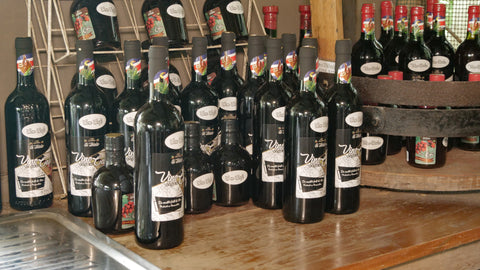BTS: Costa Rica's Coffee Farming

Atenas, Costa Rica - landscape shot.
El Toledo Organic Coffee Farm
As one of the world's major coffee exporters, we visited an organic coffee farm. The owners of the farm, Gabriel and Ivette, enlightened us about coffee brewing practices and provided refreshing transparency about the industry's wasteful practices.

Coffee carts and roasting machine pictured at El Toledo Coffee Farm.
As a multibillion-dollar industry driven by consumers worldwide, coffee is in high demand. However, only about 0.06% of the mass harvested is actually used for the products you see today. Coffee beans are the seeds of the coffee fruit, which are discarded during processing. Additionally, traditional growing methods require the eradication of other plants within the farm, decreasing biodiversity.
Gabriel and Ivette sought to combat these issues. As a family-run business, Gabriel's Father began transitioning to organic farming, realizing that using traditional methods would not be sustainable in the long-term preservation of the family business. After being passed down to Gabriel, they have adopted various practices to decrease waste and preserve the environment.
Preservation of Biodiversity
At El Toledo Coffee Farms, they adopt practices that allow their coffee to grow alongside native plant species, using it to their advantage. The presence of various types of vegetation dissuades animals and insects from consuming the coffee plant.

El Toledo Coffee Farm coffee crops and other native species.
Additionally, the family incorporates the use of various fruits and plants like vanilla and turmeric, which they use for their products and personal use. The roots of these plants decrease erosion on the farm, as the humid climate and rainy season can cause such issues to arise.



Organic bananas (left), oranges (middle), and unripe coffee fruit (right).
Maximizing Harvested Products
The farm is also investigating other coffee plant products that can be used. They produce not only coffee beans but also coffee wine, coffee tea, and coffee jam. All these products are made from the fruit that is otherwise discarded in the processing.


Coffee Wine (bottom) and Coffee Tea (top) at El Toledo Coffee Farm
Community Building
When discussing their practices and farming methods, Gabriel emphasized the importance of community. The mountainous region of Atenas, where they reside, is home to various other farms that adopt the same practices. In order to preserve their values, El Toledo Coffee Farm recognizes the strength in their community. They also partner with others in the community to promote their family-run businesses.


Gabriel owner of El Toledo Coffee Farm (left). Saul and his family (right) cooking in their family run kitchen.
At SINGLA, we believe that innovation requires transparency, education, and action. The teachings and newfound revelations in the sustainable agricultural industry not only highlight ways in which we can reduce waste but can also spark sustainable innovations and conversations that can be applied across industries.
You can embark on a journey through the life cycle of coffee by booking a coffee tour with Gabriel and his family. If you're looking to shop for sustainable coffee products, check out our coffee guide for sustainable products and practices.
Singla xx









